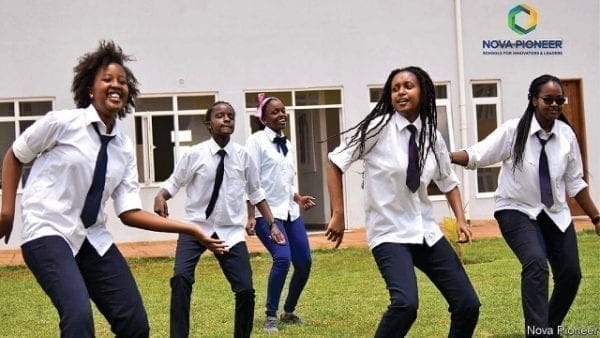
Alliance, which sits in wooded grounds in Kikuyu, a small town north-west of Nairobi, was founded in 1926 by missionaries to educate bright Africans and, by selecting boys from all the country’s regions and tribes, to build a country. After independence in 1963 it became one of Kenya’s “national” schools, similar to Britain’s selective state “grammar” schools. Eight ministers in the post-independence cabinet in 1963 were Alliance old boys. Alumni still proliferate in the top ranks of the professions, government and business.
On a hilltop 20 miles to the east are the Nova Pioneer boys’, girls’ and primary schools. They were founded in 2015 by Chris Khaemba, headmaster of Alliance from 1998-2007. Secondary-school fees are 500,000 shillings a year ($4,945). At Alliance, tuition is free; boarding fees are 54,000 shillings a year.
The pupils at both establishments have similarly impeccable manners and many come from similarly prosperous backgrounds. But they reflect the past and future of Kenyan elite education.
In the past, rich Kenyans tended to send their children to private primary schools, in the expectation that they would do well enough to get a place in a national school and thus a free, rigorous secondary education. But in recent years, several things have changed.
One is the growth of a class of prosperous Kenyans, many of whom take foreign holidays, clog Nairobi’s streets with 4×4 cars and have novel views about education. Kenyan schools tend to feature large classes and rote-learning. At Nova Pioneer, classes are smaller—32 pupils, on average—and more participatory. “Many parents want a wholesome experience that isn’t just drilling,” says Rose Nduati, the head teacher of Nova Pioneer Girls. “We’re being taught coding,” says Stacey Wanyoike, a Year 10 student. “I find that really cool. And in the other lessons, you’re not just reading notes, you’re taking part.”
Government policy is encouraging the growth of private schools. The state is committed to providing free secondary education for all, and although that has not yet been fully implemented, rising grants from central government have brought fees down. Pupil numbers have therefore been increasing. At Alliance they have doubled in the past decade, to 1,600, and class sizes have increased from an average of 42 to 50-55. “We are a little bit stretched,” says James Kinyanjui Kuria, Alliance’s deputy head. A new curriculum may reduce the rote element in state education, but there are fears that teachers are not prepared, so it may put a further strain on state schools.
Duncan Olumbe, an Alliance alumnus, decided that his son Roy should not follow him to his old school. Roy was put off by the stories of bullying; Mr Olumbe and his wife liked the ways of Nova Pioneer and thought that “the transition from a private primary to an overcrowded [state secondary] may be a bit difficult.” He is pleased with his investment, but some customers are trickier. “Most parents are middle-class [by which Kenyans mean the top 2% or so]. Catering to the needs of a very discerning demographic brings with it a certain element of challenge,” says Charles Tsuma, the head of Nova Pioneer Boys, delicately.
Super Nova
Nova Pioneer has plenty of competition: in 2013-17 the number of private primary schools almost doubled and the number of private secondaries rose by half. Some schools are said to be struggling, especially at the top end of the market (1m-2.5m shillings a year) which is beyond the reach of all but the richest Kenyans, and therefore relies to a large extent on expats.
Supply is growing to meet demand, thanks in part to international capital. Education has a particular appeal to long-term investors, for children are locked in for up to 12 years. Growth prospects are good because governments are not satisfying the rising demand for good education. And the regulatory environment for private schools in the three big African markets, South Africa, Nigeria and Kenya, is generally favourable. That is not the case everywhere: in India, for instance, which would otherwise be a very attractive market, although private schools are proliferating, for-profit education is banned.
Nova Pioneer, which was formed through a merger between Mr Khaemba’s schools and a South African chain, is financed by Fairfax Africa, a Canadian fund. ADvTECH, a South African chain, bought Makini, a group of nine schools in Kenya and Uganda, earlier this year. In 2015 Brookhouse, a posh Kenyan school, was bought by Inspired, an international chain, which then opened a new campus.
The growth of the business has implications for society. The old system had its virtues: although, over time, it was captured by the elite, in its early days it gave poor clever children from far-flung areas a chance, and helped build the idea of a nation. The private schools will encourage social stratification by allowing well-off parents to buy their children educational and thus professional advantage, as happens in Britain and America. Kenya may follow the same path as Brazil and Argentina, where a shift into private education in the 1970s and 1980s led to neglect of the public sector. But the trend will also mean more investment in schools, a better, more questioning, education and an increased flow of Kenyans into universities abroad.
And, in its way, the new model of elite education brings together people from different parts of society. Wilson Sossion, for instance, the head of the teachers’ union, who has been campaigning for the closure of the low-cost Bridge International Academies (see article) sends his children to Brookhouse, which charges 1m shillings a year.









